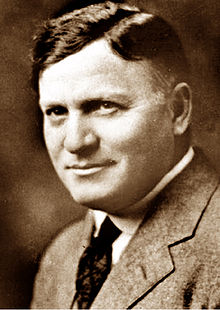- Max Ehrmann
-
Max Ehrmann 
Born September 26, 1872
Terre Haute, IndianaDied September 9, 1945 (aged 72)
Terre Haute, IndianaResting place Highland Lawn Cemetery, Terre Haute, Indiana
39°28′35″N 87°20′52″W / 39.4763985°N 87.3478012°WCoordinates: 39°28′35″N 87°20′52″W / 39.4763985°N 87.3478012°WResidence Terre Haute, Indiana Nationality  United States
United StatesEthnicity Bavarian-American Alma mater DePauw University
Harvard UniversityOccupation Attorney
businessmanKnown for prose poem Desiderata (1927) Home town Terre Haute, Indiana Spouse Bertha Pratt King Ehrmann Parents Maximilian Ehrmann, Sr.
Margaret Barbara Lutz EhrmannNotes Max Ehrmann (September 26, 1872 – September 9, 1945) was an American writer, poet, and attorney from Terre Haute, Indiana, widely known for his 1927 prose poem "Desiderata" (Latin: "things desired"). He often wrote on spiritual themes.
Contents
Education
Ehrmann was of German descent; both his parents emigrated from Bavaria in the 1840s. Young Ehrmann was educated at the Terre Haute Fourth District School and the German Methodist Church.
He received a degree in English from DePauw University in Greencastle, Indiana, which he attended from 1890 to 1894. While there, he was a member of Delta Tau Delta's Beta Beta chapter[3] and was editor of the school newspaper, Depauw Weekly.[2]
Ehrmann then studied philosophy and law at Harvard University, where he was editor of Delta Tau Delta's national magazine The Rainbow, circa 1896.[4]
Professional life
Ehrmann returned to his hometown of Terre Haute, Indiana in 1898 to practice law. He was a deputy state's attorney in Vigo County, Indiana for two years. Subsequently, he worked in his family's meatpacking business and in the overalls manufacturing industry. At age 40, Ehrmann left the business to write. At age 54, he wrote Desiderata, which achieved fame only after his death.[1][5]
Legacy
Ehrmann was awarded Doctor of Letters honorary degree from DePauw University in about 1937.[6] He was also elected to the Delta Tau Delta Distinguished Service Chapter, the fraternity's highest alumni award.[3]
Ehrmann died in 1945. He is buried in Highland Lawn Cemetery in Terre Haute, Indiana. In 2010 the city honored Ehrmann with a life-size bronze statue by sculptor Bill Wolfe. He is depicted sitting on a downtown bench, pen in hand, with a notebook in his lap. "Desiderata" is engraved on a plaque that resides next to the statue and lines from the poem are embedded in the walkway. The sculpture is in the collection of Art Spaces, Inc. - Wabash Valley Outdoor Sculpture Collection. [7]
Bibliography
- Max Ehrmann (1898). A Farrago[4]
- Max Ehrmann (before 1938). A Fearsome Riddle
- Max Ehrmann (before 1938). A Prayer and Selections
- Max Ehrmann (before 1938). Breaking home Ties
- Max Ehrmann (before 1938). The Poems of Max Ehrmann
- Max Ehrmann (before 1938). A Passion Play
- Max Ehrmann (before 1938). The Wife of Marobuis
- Max Ehrmann (before 1938). David and Bathsheba
- Max Ehrmann (before 1938). Scarlet Women
- Max Ehrmann (before 1938). Book of Farces
- Max Ehrmann (before 1938). The Bank Robbery
- Max Ehrmann (before 1938). The Plumber[6]
- Bertha Pratt King Ehrmann (1948). The Poems of Max Ehrmann (includes Desiderata)
- Bertha Pratt King Ehrmann (1951). Max Ehrmann: A Poet's Life
- Bertha Pratt King Ehrmann (1952). The journal of Max Ehrmann
References
- ^ a b Drummy, Deborah Curtis (March 1, 1992). "Historical Treasure Article: Terre Haute writer-philosopher remembered". Vigo County Historical Society. Indiana State University. http://web.indstate.edu/vchs/ht/ht030192.htm. Retrieved 2009-03-29.
- ^ a b "Max Ehrmann Pamphlets - Biography". Terre Haute, Indiana: Vigo County Public Library. http://www.vigo.lib.in.us/archives/inventories/authors/ehrmannpamph.php. Retrieved 2009-03-29.
- ^ a b "Alumni: Subpage - Distinguished Service Chapter Citation". Delta Tau Delta. http://www.delts.org/alumni/awards-distinguished-recipients.html. Retrieved 2009-03-30. "Max Ehrmann, Beta Beta (DePauw), 1894"[dead link]
- ^ a b Matthews, James Newton (1897). "Deltas in Literature". The Rainbow of the Delta Tau Delta. (DTK Beta Upsilon 1878). Delta Tau Delta Fraternity. pp. 298–299. http://books.google.com/books?id=JykUAAAAIAAJ&pg=PA298&lpg=PA298&dq=ehrmann+%22delta+tau+delta%22&source=bl&ots=zYif1Qc9Ee&sig=z1E-ewU5aTVfpSjOboNXfHY7jQw&hl=en&ei=ZK7QSd_jIqHrlQet0o3jCQ&sa=X&oi=book_result&resnum=3&ct=result#PPA298,M1. Retrieved 2009-03-30. V. 21. Original from the New York Public Library. Digitized Oct 25, 2006.
- ^ Katz, Barbara J. (Nov 27, 1977). "Popular Prose-Poem is No Work of the Ages. 'Desiderata': a Product Of an Obscure Lawyer" (Fee). Washington Post: p. 31. http://pqasb.pqarchiver.com/washingtonpost_historical/access/138227252.html?dids=138227252:138227252&FMT=ABS&FMTS=ABS:AI&date=Nov+27%2C+1977&author=By+Barbara+J.+KatzWashington+Post+Staff+Writer&pub=The+Washington+Post++(1974-Current+file)&edition=&startpage=31&desc=Popular+Prose-Poem+is+No+Work+of+the+Ages%26. Retrieved 2009-03-29. Reproduced by Volkert Braren
- ^ a b "Max Ehrmann Poet, Prophet, Philosopher" (PDF). The Wabash Valley Remembers: A Chronicle, 1787-1938. Terre Haute. 1938. pp. 52—52. http://www.vigo.lib.in.us/archives/genhistories/wabvalrem/pt44.pdf. Retrieved 2009-03-30.
- ^ Wittmeyer, Sara (2010-08-31). "Max Ehrmann Statue Unveiled in Terre Haute". Indiana Public Media. http://indianapublicmedia.org/news/max-ehrmann-statue-unveiled-terra-haute/. Retrieved 2010-09-15.
External links
Categories:- 1872 births
- 1945 deaths
- DePauw University alumni
- American poets
- Indiana lawyers
- American writers of German descent
- American prosecutors
- Harvard Law School alumni
Wikimedia Foundation. 2010.
